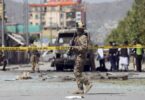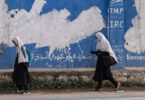HAGUE (Agencies): A panel of senior judges at the International Court of Justice (ICC) on Thursday at the Hague in the Netherlands authorized an investigation into alleged war crimes and human rights violations by the warring sides into the conflict in the war-ravaged country.
Today’s historic verdict overturns an earlier rejection of a request to examine actions of the warring sides in Afghanistan, including US forces, the Taliban and Afghan security forces.
Judges at the Hague last year had rejected a demand by the chief prosecutor to open a full investigation into crimes committed in Afghanistan.
The call for an investigation had also sparked some reactions in Washington.
But today’s ruling has given the green light for an investigation. The statement from the ICC read:
“Today, March 5, 2020, the Appeals Chamber of the International Criminal Court (‘ICC’ or ‘Court’) decided unanimously to authorize the Prosecutor to commence an investigation into alleged crimes under the jurisdiction of the Court in relation to the situation in the Islamic Republic of Afghanistan. The Appeals Chamber’s judgment amended the decision of Pre-Trial Chamber II of April 12, 2019, which had rejected the Prosecutor’s request for authorization of an investigation of November 20, 2017 and had found that the commencement of an investigation would not be in the interests of justice. The Prosecutor had filed an appeal against that decision. Judge PiotrHofmanski, the presiding judge in this appeal, read a summary of the Appeals Chamber’s judgment in open court,” the ICC said in a statement.
The statement also reads: “Having considered the Prosecutor’s grounds of appeal against the Pre-Trial Chamber’s decision, as well as the observations and submissions of the Islamic Republic of Afghanistan, representatives of victims and other participants, the Appeals Chamber found that the Pre-Trial Chamber erred in considering the ‘interests of justice factor’ when examining the Prosecutor’s request for authorization to open an investigation. In the Appeals Chamber’s view, the Pre-Trial Chamber should have addressed only whether there was a reasonable factual basis for the Prosecutor to proceed with an investigation, in the sense of whether crimes have been committed, and whether the potential case(s) arising from such investigation would appear to fall within the Court’s jurisdiction. Noting that the Pre-Trial Chamber’s decision contained all the necessary factual findings and had confirmed that there is a reasonable basis to consider that crimes within the ICC jurisdiction have been committed in Afghanistan, the Appeals Chamber decided to authorize the opening of an investigation itself, rather than to send the matter back to the Pre-Trial Chamber for a new decision.”
The statement continues: “The Appeals Chamber found that the Prosecutor is authorized to investigate, within the parameters identified in the Prosecutor’s request of November 20, 2017, the crimes alleged to have been committed on the territory of Afghanistan since May 1, 2003, as well as other alleged crimes that have a nexus to the armed conflict in Afghanistan and are sufficiently linked to the situation in Afghanistan and were committed on the territory of other States Parties to the Rome Statute since July 1, 2002.
Meanwhile, Human Rights Watch and Afghanistan Independent Human Rights Commission (AIHRC) welcomed a ruling by the International Criminal Court (ICC) to investigate alleged cases of human rights violations by the warring factions in Afghanistan.
“This is welcome news for Afghanistan and justice for victims of war. Gratitude to victims who submitted testimonies and brave Afghan organizations and activists who advocated fearlessly and tirelessly for this outcome,” tweeted Shahrzad Akbar, the chairperson of the AIHRC.
This new development takes place in the midst of a peace agreement between the US and the Taliban that was intended to pave the way for the return of the Taliban into the political process of Afghanistan, and for the withdrawal of foreign forces from the country and to kick start intra-Afghan talks.
“Upcoming talks between the Taliban, the Afghan government, and other Afghan political leaders should make human rights protections a priority, Human Rights Watch said in a statement on Wednesday, adding: “The negotiations should include meaningful participation by women, victims’ groups, and proponents of legal and constitutional reforms.”
“A durable peace agreement in Afghanistan needs to ensure the protection of fundamental human rights and mechanisms to provide justice for serious abuses,” said Patricia Grossman, associate Asia director. “To achieve these goals those most affected by the conflict should have a meaningful role in the process.”
On February 14 last year, the ICC announced it would not pursue an investigation into alleged war crimes. A panel of ICC judges last year rejected a request by the court’s prosecutor to investigate war crimes alleged to have occurred in Afghanistan by the US military and intelligence services, as well as other sides. US President Donald Trump at the time praised the decision.
“This is a major international victory, not only for these patriots but for the rule of law,” said Trump at the time. “Any attempt to target American, Israeli, or allied personnel for prosecution will be met with a swift and vigorous response,” Trump said.
In a separate statement last year, US Secretary of State Mike Pompeo said such an investigation “would not serve the interests of justice.”
He called the courts decision “a victory for the rule of law and the integrity of the ICC as an institution, given that the United States is not subject to the ICC’s jurisdiction”.
According to the report, Washington signed, but never ratified, the Rome Statute that was founded by the tribunal in 2002. While the United States worked with the ICC under the Obama administration to bring Ugandan militants to justice, the Trump administration has been strongly critical of the organization.






